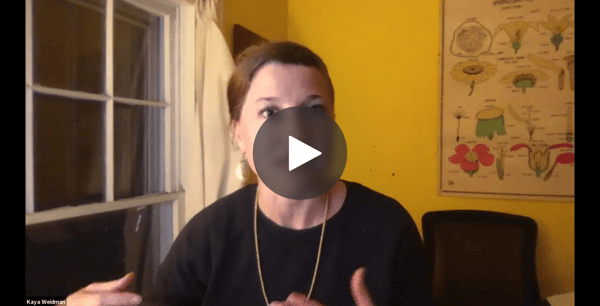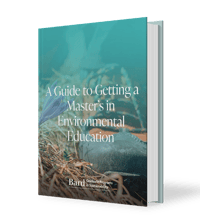Master's in Environmental Education
M.Ed. in Environmental Education
+ Page Menu
$15,000 CEP Fellowship For All Students Admitted for fall 2026
All students admitted to the Bard CEP for fall 2026 enrollment will receive a guaranteed minimum Fellowship of $15,000 for their first year at CEP. More details here.
Environmental Education Master's Overview
Our M.Ed. Takes You from Classroom to Impact in 9 Months
To mitigate the consequences of climate change, we must engage a rising generation now, which requires more than what typical conservation education offers. We need education for sustainable development, in particular. And we believe environmental education programs need to equip the next generation with the tools they need to deal with critical sustainability challenges—from climate to biodiversity loss, ocean pollution, and air toxics.
Bard's environmental education degree uniquely enables students to begin high-impact work after only nine months of study. Students spend an intensive two semesters at Bard, mastering the tools required to educate the next generation of environmental leaders. In June of the second year, they then spread out across the US and internationally, creating impact through a required, 4-6 month high-level professional Internship followed by an outcome-oriented Capstone Project that typically builds on the internship.
First Year: Academic Training in Natural Science Education
.jpg?width=363&name=IMG_1910%20(1).jpg)
Students pursuing the M.Ed. take a carefully curated program that combines environmental education classes with graduate courses from the MS programs at the Center for Environmental Policy, the Master of Arts in Teaching (MAT) program, and elective options from other Bard undergraduate and graduate programs, including the MBA in Sustainability. In addition to a core classroom curriculum, an emphasis on experiential learning takes students outside into the mountains to complete a hands-on January-term intensive course focused on place-based and outdoor education. Throughout, there is a focus on environmental education within the places where students are living, from urban parks, wetlands, and waterways, to rural farmlands and forests.
First-year courses cover several key topics:
-
Environmental Science of the Natural and Built Environment
-
Foundations of Environmental Education
-
Place-Based and Outdoor Education
-
Curriculum Development
-
Adolescent Identity, Culture, and Learning
Beginning in June of the second year, students explore their individual career interests through a required 4-6 month, full-time professional internship, and by researching and writing a Capstone Project. Internship sites range from Australia to China, South Africa to Geneva, NYC to DC, and across the US. In the final semester, students complete a Master’s degree capstone project under the direction of a Bard faculty member, while attending capstone seminar classes online. Students gather at Bard for two, one-week residencies during this final term.
The two-year environmental education curriculum ensures that graduates develop broad and deep knowledge of environmental science and education pedagogy; a strong suite of analytical, communication, and problem-solving skills; tools for building education organizations; significant professional experience in their chosen field; and finally, specialized expertise on the particular topic of their research project. In short, Bard's environmental education program is designed to deliver true mastery over the student's area of focus, providing a strong foundation for career success.
Watch the recording from our webinar, Building a Career in Sustainability: Advice From Environmental Education Specialists:
Schedule a Meeting to Learn More
Distinctive features of the Environmental Education Degree:

Integrated, Interdisciplinary Curriculum
all of the environmental master's degrees at Bard feature a unique, modular core curriculum where students explore issues like air and atmosphere pollution, biodiversity loss, or ecosystem service provision simultaneously in their science, education, and policy courses. This unique structure creates a powerful dialogue across disciplines, always driving toward solutions. A traditional outdoor education degree cannot deliver this level of interdisciplinary focus across classes, as students typically do not take the same courses together. Bard's core curriculum supports faculty to coordinate closely across classes, allowing the program to complete the delivery of the foundational educational toolkit in nine months. This frees up the second year of study for the professional internship and capstone project.

1:1 Faculty Engagement
Unlike many other environmental education programs, Bard's M.Ed. program offers every student individualized engagement with expert faculty on student research, writing, and communication. Our small class size and dedicated graduate faculty provide students with unmatched access to their professors and mentorship opportunities.

High-level, Extended Professional Internships
All students getting their environmental education master's degree complete a 4-6 month, student-driven, full-time environmental education internship from June to January of the second year in the community (nationally or globally) of their choosing.
The internship is a major item on our graduates' resumes and supports the development of their career networks. Between 30% and 50% of internships turn directly into jobs. The internship typically forms the basis for the student's Master's Capstone Projects.
Bard helps students find internship opportunities with a variety of institutions, and is continuously expanding its list of internship sponsors. The internship allows students to follow their preferred areas of specialization locally, elsewhere in the United States, or abroad. The internship gives students an applied focus to their environmental education master's and an opportunity to learn in a professional setting the job-specific skills they will use upon graduation.

Community Engagement, Place-Based Education, Peace Corps Option
Community Engagement
Throughout their time in the program, M.Ed. students engage with local environmental organizations serving various communities in the Hudson Valley to learn about various forms of environmental education and outreach. Students also meet weekly with regional environmental education leaders to learn how they built their careers in the industry and gain insights into the field.
J-Term Immersive Field Course
In January of the first year, M.Ed. students spend two weeks doing day trips and overnight expeditions into the Taconic Mountains to gain field education experience.
Peace Corps Option
Bard also offers students the opportunity to combine their graduate work with Peace Corps service - click here to learn more.

Individualized Research Opportunities
At Bard, the Capstone Project provides the opportunity for students to develop true mastery in their chosen field of interest. Unlike at more traditional environmental education programs, where a capstone project is derivative of a faculty member's research interest, at Bard, students develop their own capstone topics, often focused on addressing an educational opportunity identified during the student's internship. In these cases, students devote an entire year to practical work in the area in which they are passionate: six months of hands-on experience as an environmental educator or similar, coupled with six months of academic analysis and reflection through their capstone work. This kind of mastery provides a strong foundation for career success. Each Master's Project is carefully mentored by two Bard CEP Faculty members, including a primary and secondary advisor.

Career Focus
Whether you're looking for a role at an environmental center, openings as a K-12 teacher, or simply jobs for people who love the outdoors, any career in environmental education can be distilled into a desire to "change minds" to educate the next generation of sustainability leaders. In a typical year, close to 40% of students that graduate from the Bard M.Ed. program are already employed, primarily as a result of job offers arising from the professional internship. On average, 75-85% of graduates find work in the environmental education sector within six months of graduation.
Career Development
Students are thinking about career outcomes from day one at Bard. While studying the various methods of teaching environmental education, students are also exposed to the work of a wide range of organizations (from local to global), so they can learn about the many career opportunities available in environmental education.
Career development exercises are also intentionally integrated into the environmental education curriculum and include developing the following skills:
- Resume and cover letter writing
- Conducting informational interviews
- Blog and memo writing
- Professional networking
- Personal branding
- The "art of the ask"
- Presentations - building decks and giving effective public presentations
To learn about the diverse careers our graduates are pursuing, please review our Alumni Profiles.
Environmental Education Classes & Course Work
Students in our environmental education programs have a carefully curated course list that combines a core of environmental education pedagogy with environmental science and general teacher education through the MAT. Courses emphasize analytical frameworks and basic principles through examples and case studies. Joint class sessions, field trips, guest lectures, and conferences expose students to the critical issues and contemporary practices of environmental education. Throughout, there is a focus on engaging a wide diversity of audiences—especially due to misinformation and myths about climate change—with the core ideas of ecological literacy. The nine-month interdisciplinary curriculum, combined with the internship and the Capstone project in the second year, allow students to specialize in their chosen field of interest and launch a high-impact career where they can change minds.
Course Descriptions View Faculty Members
Course Descriptions
Total Credits for MEd = 60
Year 1 (full-time students)*
*Students interest in part-time enrollment should contact the Admissions Team to learn about the part-time course of study
Environmental Science of Natural and Built Environments (Fall + Spring)
This course uses a systems framework to understand local, regional and global biogeochemical processes as a foundation to assess environmental impacts on social-ecological systems in the Anthropocene. In coordination with the economics, law, and policy courses in the program, this two-semester science sequence teaches students fundamental concepts in scientific assessment, including “Western” and indigenous perspectives, which are then applied to topics such as global nitrogen loading, Indigenous forest management and implications for terrestrial carbon sequestration under climate change, ecological intensification of agriculture, and how material flows analysis underpins the Circular Economy. Case studies are chosen to highlight the intersection between scientific understanding and the institutional inequities that lead to injustices in the distribution of environmental goods and harms, with examples of pathways to solutions.
By the end of the course, students will be equipped to:
- Critically assess arguments in the peer-reviewed science literature and synthesize key ideas across a wide range of environmental topics
- Understand and engage in discussion of the ways in which race and difference impact an individual’s health and welfare outcomes in the face of environmental harms
- Utilize a “systems” framework considering mass and energy balance to assess environmental health, including an understanding of life cycle assessment
- Consider alternative perceptions of “science” as a function of culture and tradition and how these may influence environmental management
- Confidently translate peer-reviewed science articles into common language to meaningfully interact with non-experts on environmental issues
Environmental Policy I (Fall)
This course analyzes the dynamic and complex relationships among legal, political, cultural and ethical factors that shape the environmental policy process. It grounds this analysis in a historical framework that recognizes the legacies of inequity at the domestic and global scales. Using a case study approach, the course introduces students to the core concepts of environmental policy making and environmental policy cycles that include defining an environmental problem, agenda formation and crafting and implementing policy solutions. In the United States context, At both the Federal and sub-national levels, students analyze a range of factors that shape environmental and climate policies, including the nature of state-federal relations in developing and applying environmental law, the issues of environmental justice in highlighting the often uneven implementation of those laws, as well as understanding the interplay of private and public sector actors, non-governmental organization and social movements. In addition, this course explores the dynamics of international environmental regime development, conflict resolution and trans-boundary networks that influence global environmental decision making.
Learning Outcomes:
- Knowledge of core concepts of qualitative policy analysis
- Understanding how historical legacies of of injustice shape the current moment in environmental and climate policy
- Analyzing social movement formation as a critical tool in environmental and climate politics
- Identifying how the interplay of ideas, interests and institutions at the domestic and international levels influence how environmental and climate policy problems are identified, and how and what types of solutions are crafted and implemented
Foundations of Environmental Education (Fall)
Faced with multiple converging “wicked” sustainability challenges, in the upcoming decades it will become increasingly critical to have a citizenry engaged, informed, and intimately familiar with the complex inter-workings and relationships of ecological and social processes. To achieve this, it will be necessary to train a new generation of environmental educators who are proficient in explaining socio-natural entanglements, operating at the intersection of social justice and environmentalism to bring environmental education to historically marginalized populations. This class builds on the rich tradition of environmental and experiential pedagogical theory, synthesizing it with a practical toolkit of sustainable systems’ technologies and practices and culminating in environmental educational curriculum design.
Upon completion, students will:
- be well versed in concepts and skills necessary for work in a variety of environmental/sustainability education fields in informal settings
- be grounded in environmental education pedagogy, with a focus on place-based and urban environmental education
- understand how to develop and implement a lesson plan on an environmental theme in collaboration with a community partner
MAT STEM Lab (Fall)
In this course, Environmental Education students join Bard MAT Math and Science students to explore teaching and learning from various perspectives. Past personal teaching and learning experiences form the basis for thinking about curriculum planning, the Math/Science classroom, and the sources of learning difficulties some students experience. Readings, videos, case studies, and classroom observations provide the context for student-focused study of teaching and learning. Students also study standards, curricula, and curriculum materials, paying particular attention to the experiences of underrepresented groups in Math/Science, and to the sometimes competing demands of state- and national-level tests and established learning standards.
This course supports students’ ability to:
- understand key issues and questions in Science education
- develop a repertoire of practices to apply to the work of teaching
- develop and present standards-aligned lessons
Environmental Education Advisory (Fall + Spring)
Co-created by each first-year Environmental Education cohort, the weekly Advisory course offers a mixture of book discussion, site visits to local environmental education organizations, networking with regional, state and national environmental educators, and environmental education activities led by cohort members. Previous book studies have included Robin Wall Kimmerer’s Braiding Sweetgrass, David Orr’s Earth In Mind, and Richard Louv’s Last Child in the Woods.
This course supports students’ ability to:
- engage deeply with a seminal environmental education text and understand its implications for their own practice
- understand and interrogate the different pedagogies employed by environmental education organizations
- experiment with environmental education activities and teaching strategies
- build their professional networks
Communication (Fall + Spring)
Communication skills are crucial to educators’ and policymakers’ ability to mobilize against structural environmental and climate change injustices. Recognizing this, in the Communication course at Bard CEP, students work to become inclusive and inspiring writers and speakers. Students learn how to take audience and purpose into account as they read, synthesize and communicate complex science, economic and policy information. The course covers both academic and professional written and oral genres: the blog post, memo, lit review, cover letter, slide presentation, interview.
This course supports students’ ability to:
- frame their writing/presentations for differing purposes and audiences, with an emphasis on engaging community stakeholders
- find and evaluate relevant research and communicate it accessibly and accurately
- support a reader through an argument via effective introductory/concluding material, coherent sections and paragraphs, thoughtfully placed transitions, precise word choice, and clear, concise, sentences
- craft and deliver visually engaging, effectively structured, and memorable slide presentations
- analyze their own and their classmates’ writing and presentations and give and receive constructive feedback
Identity, Culture, and the Classroom (Spring)
In this course, students consider what it means for them to teach—and for adolescents to learn—in the context of contemporary American society. The course focuses on identity development and how it is influenced by cultural power dynamics around such factors as race, gender, sexual orientation, class, ability, ethnicity, and language. Students begin by exploring the concept of identity in broad terms, drawing on Erikson's developmental model as well as numerous contemporary writings. The remainder of the course focuses on the ways in which specific identity-related issues affect adolescents' school experiences. Students investigate research topics including the black/white test score gap and the school-based risks faced by sexual minority students, as well as the work of researcher/theorists Gilligan, Ogbu, Steele, Tatum, and others.
This course supports students’ ability to:
- understand the ways that identity, culture, and schooling intersect
- develop a repertoire of reflective, analytical, and practical strategies to use in their ongoing work as teachers
Place-Based and Outdoor Education (January)
This January-term intensive course foregrounds place-conscious and land education frameworks by putting students into conversation with the environmental and cultural history of a local-to-Bard site. Asking questions such as, “How do past, present and future understandings of place positionality shape our place interactions?” and “How does human agency and the agency of the more-than-human world inform how we come to understand our places?” students engage with community partners and guest speakers. The course features a three-day Catskill Mountains winter camping experience and culminates in students developing a place-focused environmental education deliverable for the course site.
This course supports students’ ability to:
- interrogate prevailing environmental and cultural narratives about a site
- respectfully incorporate indigenous place understanding and storytelling into their practice
- integrate the environmental identity development framework into their curriculum design
- collaborate with community partners
- incorporate outdoor education concepts and skills into their future teaching
2 Approved Electives (Spring)
Year Two (all students)
Master's Internship (Summer + Fall)
The 4-6 month, full-time, high-level internship with an environmental education organization gives students the opportunity to continue to develop in a professional setting the job-specific skills they will use upon graduation. The internship also typically forms the basis for students’ capstone work, as they respond to a leading-edge pedagogical question. It allows students to follow their preferred area of specialization locally, nationally, or internationally. Students report on their internship experience twice during their engagement, reflecting on applications of their first-year coursework to their work in the professional setting, and on the knowledge and skills they have used and gained.
Capstone Proposal (Fall)
Students can pursue two different Master’s Capstone avenues: (1) the Thesis, which is designed to help students understand evidence-based education research by generating a research question, developing its proof and communicating these ideas to a potential policymaker audience, and (2) the Project, which is designed to replicate a professional experience, either in the form of a consulting project or a communication piece.
Students begin to formalize capstone ideas the summer after their first year, in consultation with an advisor on the faculty. The internship allows students to explore environmental education issues and usually serves as the springboard for the capstone.
Capstone Project + Seminar (Spring)
The Environmental Education capstone provides the opportunity for students to further develop their pedagogy and practice, and they generate their own capstone topic, typically focused on responding to a question that they identify during their internship. During the year-long capstone process, and in collaboration with a faculty advisor, students explore the literature on their topic and determine the most effective methodology to explore to their research question. While some students choose to write a traditional master’s thesis, others develop a curriculum, toolkit, or entrepreneurial project. In the spring semester of their capstone year, students participate in the Capstone Seminar course, in which they present weekly on their work and receive feedback from faculty members and their classmates. The process culminates in a public-facing presentation during which students respond to questions about their research and deliverables.
Leadership and Careers in Environmental Education
This class provides next steps and career readiness training for environmental education graduate students preparing to transition from graduate school to the professional world. It focuses on both high-level pedagogical theory to supplement that studied in the introductory class as well as practical skills for job readiness.
Upon completion, students will:
-
draft a proposal for an environmental education program that could be used in a funding application. This proposal can either be hypothetical or actual, and as such should be “recyclable” for future applications.
-
be assigned a week of the class to deliver a one-hour presentation on a research topic of their choosing. This may be based on their literature reviews, capstone research, or on an entirely new topic.
-
gain familiarity with in the inside workings of the world of non-profit philanthropy
-
develop expectations of employment standards in the field of environmental education
Teaching Certification
The Bard M.Ed. in Environmental Education degree does not lead to a teaching certification. If a student is interested in a teaching certification, they should consider either the dual MS/MAT or MEd/MAT degree options.
View Dual Degree Options
2023-2024 Academic Calendar
|
August 28-September 1, 2023 |
Workshop Week |
|
September 4, 2023 |
Fall Semester Classes Begin |
|
October 9-10, 2023 |
Fall Reading Days |
|
November 20-24, 2023 |
Thanksgiving Reading Week |
|
December 18-22, 2023 |
Exam Week |
|
December 25, 2023 - January 12, 2024 |
Winter Recess |
|
January 15-26, 2024 |
MEd Place-Based and Outdoor Education Course |
|
January 29-February 2, 2024 |
Research & Writing Week |
|
February 4, 2024 |
Spring Semester Classes Begin |
|
March 18-22, 2024 |
Spring Reading Week |
|
May 20-24, 2024 |
Exam Week |
|
May 23-24, 2024 |
Capstone Presentations |
|
May 25, 2023 |
Commencement 2024 |
Fall 2023 Semester:
First-Year Students: August 28 - December 22
Second-Year Students: September 4 - December 22
Spring 2024 Semester:
First-Year Students: January 15 - May 24
Second-Year Students: February 5 - May 24
Sample Weekly Schedule
| Monday | Tuesday | Wednesday | Thursday | Friday |
|
Environmental Science |
Environmental Science 10:00-11:30am |
|||
| Communication 11:30am-1:00pm |
Advisory 12:00am-1:00pm |
Brown Bag Series/ National Climate Seminar 12:00-1:00pm |
||
|
|
Environmental Policy 1:30-3:00pm |
Foundations of Environmental Education 1:30-3:00pm |
Environmental Policy 1:30-3:00pm |
|
|
MAT STEM Lab |
2024-2025 Academic Calendar*
|
August 26-August 30, 2024 |
Workshop Week |
|
September 2, 2024 |
Fall Semester Classes Begin |
|
October 14-15, 2024 |
Fall Reading Days |
|
November 25-29, 2024 |
Thanksgiving Reading Week |
|
December 16-20, 2024 |
Exam Week |
|
December 23, 2024 - January 10, 2025 |
Winter Recess |
|
January 13-24, 2025 |
MS Sustainable Development in Oaxaca Course |
|
January 27-January 31, 2025 |
Research & Writing Week |
|
February 3, 2025 |
Spring Semester Classes Begin |
|
March 17-21, 2025 |
Spring Reading Week |
|
May 19-23, 2025 |
Exam Week |
|
May 22-23, 2025 |
Capstone Presentations |
|
May 24, 2025 |
Commencement 2024 |
Fall 2024 Semester:
First-Year Students: August 26 - December 20
Second-Year Students: September 2 - December 20
Spring 2025 Semester:
First-Year Students: January 13 - May 23
Second-Year Students: February 3 - May 23
Sample Weekly Schedule
|
Monday |
Tuesday |
Wednesday |
Thursday |
Friday |
|
Environmental Science |
Economics 9:30-11:00am |
Environmental Science 10:00-11:30am |
Economics 9:30-11:00am |
Environmental Law 10:00-11:30am |
| Communication 11:30am-1:00pm |
Brown Bag Series/ National Climate Seminar 12:00-1:00pm |
|||
|
Statistics/ |
Environmental Policy 1:30-3:00pm |
Environmental Law 1:30-3:00pm |
Environmental Policy 1:30-3:00pm |
Statistics/ Econometrics 1:30-3:00pm |
Campus Visits
Whether you are hoping to better understand class structure, make connections with faculty and current students, or get a feel for campus culture - visiting campus is the best way to find out if Bard Center for Environmental Policy is the right fit for you.
When you register for a campus visit, our Bard Graduate Programs in Sustainability admissions staff work with you to customize an on-campus experience, which may include attending class, having lunch with current students, meetings with faculty, and taking a tour of campus.
History
Founded in 1999
A History of Leadership
The founding director of the Bard Center for Environmental Policy, Joanne Fox-Przeworski, developed the Center in order to raise awareness of the environment and engage the public through programs such as the Open Forum lecture series. Fox-Przeworski brought to Bard her deep commitment to interdisciplinary environmental education, in particular international studies, as well as her experience as former director of the United Nations Environment Programme.Since joining Bard CEP as director in 2009, Eban Goodstein has built on the success of the Center’s interdisciplinary educational model, adding his passion for the issue of our time, climate change. In 2010 Goodstein launched a new MS degree in Climate Science and Policy. Goodstein built on previous national efforts to raise awareness and encourage action on climate change issues by expanding the Center’s public programs to offer the National Climate Seminar and the C2C Fellows Network. In 2012 Goodstein founded the Bard MBA in Sustainability (now ranked as the #1 Green MBA) and in 2016, expanded Bard CEP offerings to include a MEd in Environmental Education degree. In 2020, Goodstein further expanded CEP's public programs with the launch the Solve Climate by 2030 initiative, now a global program.
Want to learn more?
Let's chat!
We love to chat one-on-one with aspiring change agents. Our team is happy to schedule a call to discuss your sustainability career goals and tell you more about our various programs. We can also get you connected with an alum, professor, or student doing work you are interested in learning more about.

